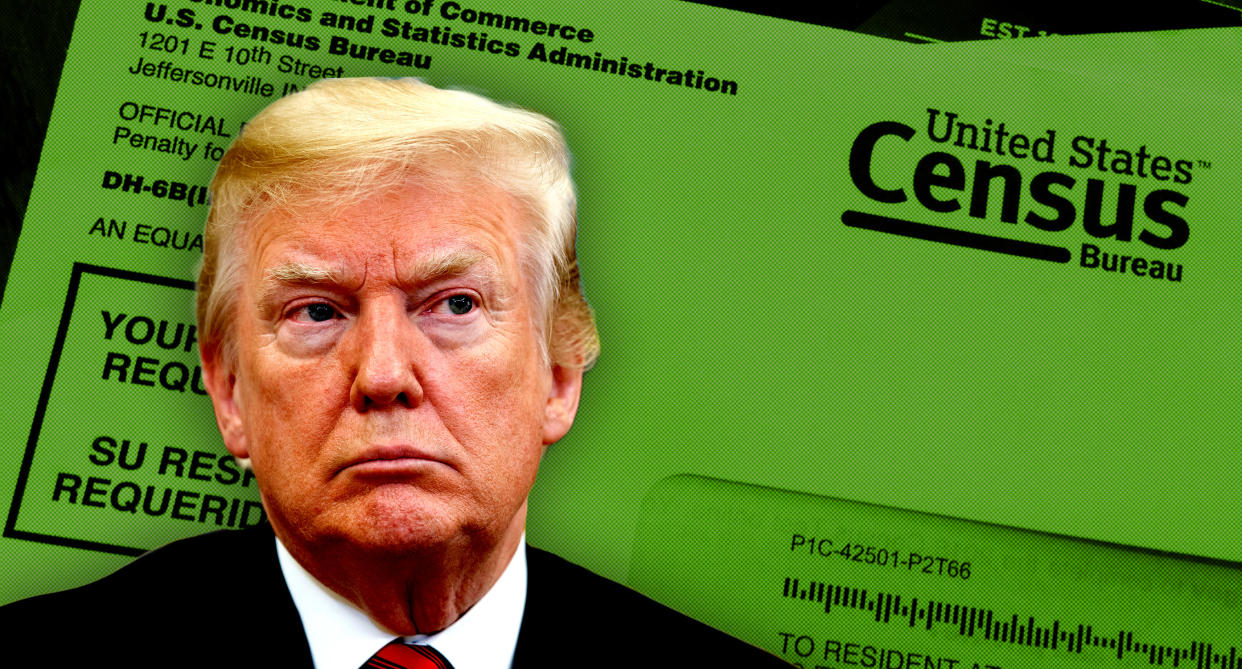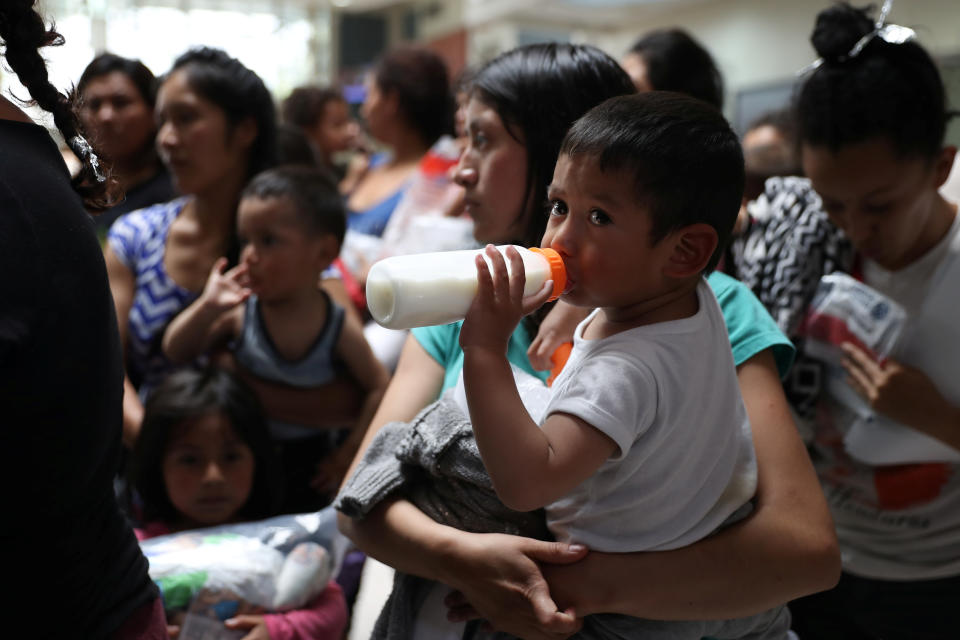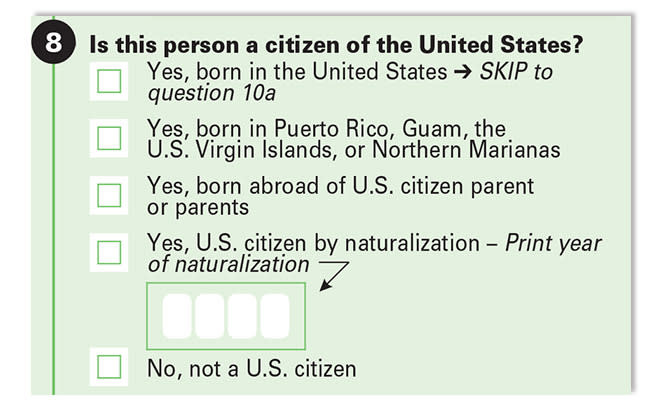Trump's census citizenship question could lead to massive undercount of needy children, report says

Fears of a federal immigration crackdown could lead many Americans to avoid participating in the 2020 federal census, which will include a controversial question about citizenship for the first time in 70 years. That, in turn, could cause as many as 1.5 million children to go uncounted, imperiling their access to federal programs, including food stamps and early childhood education.
Those findings come in the 2018 version of the annual “KIDS COUNT: Data Book” report from the Annie E. Casey Foundation, which warns that the citizenship question could exacerbate a longstanding problem. Demographers first noticed that children were significantly undercounted in the 1980 census and have struggled since to understand why.
“If we don’t know that they’re there, services can’t be directed,” Mary Jo Hoeksema, director of government affairs at the Population Association of America, told Yahoo News.
In 2010, the census missed about 1 million young children. Since the federal government didn’t know these children existed, it could not figure them into its decision-making process regarding the distribution of some $880 billion in federal funds. That included funding for some of the nation’s most popular safety-net programs, including the Supplemental Nutrition Assistance Program, the Head Start early childhood education program, Medicaid and the Children’s Health Insurance Program, as well as funding for special education, school lunches and subsidized housing.

She is especially concerned about “vulnerable populations” that would stand to benefit from federal programs. African-American and Latino children tend to be most vulnerable to an undercount, as well as children who grow up in foster families or are raised in arrangements where their primary guardian is not a parent. In 2020, foreign-born groups might be less likely to respond to the census because, earlier this year, Commerce Secretary Wilbur Ross directed the Census Bureau, which is under his purview, to include a question about whether the respondent is an American citizen.
Critics believe that the question is unnecessary, since the federal government has other means of calculating citizenship rates, most notably through the American Community Survey. Immigrants and naturalized citizens could also conclude that the Trump administration may use the question in an attempt to find, prosecute and ultimately expel undocumented immigrants. Their refusal to respond to the census could depress population counts, which would skew the congressional redistricting efforts that follow the decennial federal census. In such a scenario, Republicans would likely benefit, since people turned off by the citizenship question are somewhat more likely to live in Democratic districts that would see their populations reduced — and their congressional and statehouse representation diminished.
John Gore, the Department of Justice official who pressed for the citizenship question, was formerly a lawyer in private practice who worked on Republican redistricting efforts across the nation. Democrats on the House Oversight Committee are investigating the process that led to the question’s inclusion, with limited support from their Republican counterparts.
The Annie E. Casey Foundation’s 2018 “KIDS COUNT” highlights the real-world damages the citizenship question could cause. “This is a completely unnecessary question to add to the census,” the foundation’s president, Patrick McCarthy, told Yahoo News. He believes that it is “very likely to suppress participation” beyond historic rates and lead to “a major increase in the undercount,” though he declined to speculate on how many additional children would go uncounted. A press release by the Annie E. Casey Foundation that went out ahead of the report said that “about 4.5 million young children live in neighborhoods where there’s a high risk of missing kids in the count.”

In 2000, the Census Bureau embarked on a partnership program “to mobilize grass roots efforts to boost participation in the census,” as that program was described in a report to Congress. That year, some 140,000 organizations participated.
That shared mission and cooperative spirit may have vanished in recent months. “In the past, trusted voices from the immigrant community had no problem telling people it was safe to respond to the census,” says William O’Hare, who has worked in the past on the Annie E. Casey Foundation report and is now president of O’Hare Data and Demographic Services LLC. The demonization of immigrants by the Trump administration has many groups reluctant to help with the 2010 census. Recent reports that immigration officials could be targeting naturalized citizens for enforcement actions are likely to further the perception that the federal government is willing to use its resources to achieve its goal of implementing and executing an unforgiving immigration policy.
“They may be here legally but are wary of why the government wants to collect this information,” O’Hare says of the citizenship question. He believes that the Census Bureau is “swimming upstream” in trying to bolster confidence ahead of the 2020 census.
A spokesperson for the Census Bureau declined to reply to a Yahoo News inquiry about how the citizenship question could affect the count of young children.
According to the Annie E. Casey Foundation report, two of three the states with the most children living in “hard-to-count” census tracts are California and New York, which means that they could suffer from an even smaller response rate than in previous years and result in a decrease in federal funding (the other state in that trio is Texas). Both states voted heavily for Hillary Clinton in the 2016 presidential election, leading President Trump to falsely charge that millions had voted fraudulently there.
_____
Read more from Yahoo News:
Stephen Miller, meet your great-grandfather, who flunked his naturalization test
From the ‘Northern Triangle’ to the Rio Grande: Violence, poverty and disasters drive migration
Civility alert: Can’t we all just get along, or even get dinner?
With DACA phasing out, college graduates face an uncertain future
Photos: Reaction to Supreme Court decision upholding Trump’s ‘travel ban’


